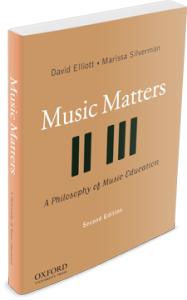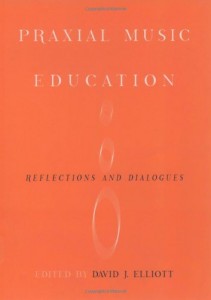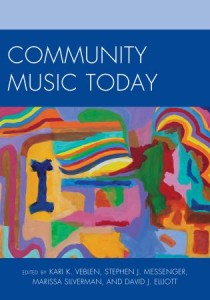If you’ve arrived at this web site after reading the first chapter of Praxial Music Education, then you know what it’s about. If you’ve arrived via another route, you probably don’t. Either way, a few words of introduction are in order.
- Elliott, David J. (Ed.). (2005). Praxial Music Education: Reflections and Dialogues. New York: Oxford University Press.
- Elliott, David J. (1995). Music Matters: A New Philosophy. New York: Oxford University Press.
In 1995 I published Music Matters: A New Philosophy of Music Education (or MM, for short). MM offers a praxial philosophy of music education. In 2005 I organized a collection of essays about MM titled Praxial Music Education: Reflections and Dialogues (or PME, for short). The essays in PME discuss many issues in the field of music education with particular attention to my views on these issues MM.
Why bother publishing a book like PME and asking colleagues to critique my work? I give several reasons in the first chapter of PME (p. 4). The main reason is that all fields of study must continuously study and critically appraise their foundational beliefs if they are to avoid stagnation or death. Taken together, the combination of PME and this web site is an effort to contribute to critical thinking about the foundations of music education. Also, by opening MM to critical commentaries, my colleagues and I have an important opportunity to clarify our views with and for each other, and for music educators-at-large, and for students of music education who are developing their professional
Why is it difficult to build foundations, articulate fundamental issues, and grasp alternative viewpoints in music education? There are many reasons. First, as I said in MM:
“the questions raised by music teaching and learning form a kind of philosophical hub at the center of practical life. Like the spokes of a wheel, they take us to the heart of what it means to be human. They raise complex issues of knowing, meaning, thinking, feeling, teaching, learning, acting and believing. As Aristotle emphasized centuries ago: ‘It is not easy to determine the’” (p. 5).
Needless to say, if Aristotle was challenged by the problems involved in explaining music and music education, it’s not surprising that the rest of humanity would, too.
Regelski (2004) offers other reasons why it’s difficult to think and write about foundational issues in music education: “In the act of offering his or her ideas, every author risks a minefield of problems, especially if his or her ideas challenge traditional beliefs, draw on new sources, and/or offer alternative.”
As the authors in PME point out, the ideas in Music Matters and the issues it raises do all of the above. For example, as Bowman says in his essay, “the praxial view is not so much an alternative music philosophy as a dramatic effort to redefine the traditional bounds of music philosophical discourse. Clearly, the praxial turn draws into the ‘musical’ fold” (p. 56).
Another set of themes in MM concern complicated issues
Among the first analyses of the moribund status of traditional curricular thinking in music education is David Elliott’s innovative Music Matters (1995). Elliott offers a comprehensive challenge to traditional aesthetic philosophies of music education and an in-depth analysis of curriculum theory. His critique of abstract, atomistic content and isolated skills of the conventional objectives-oriented and structure-of-the discipline approaches to music curriculum drew upon and thus reflected the most recent trends in curriculum theory in the early 1990s. He also advanced a provocative and incisive theory of curriculum-as-practicum, designed and organized “to engage learners in musical actions, transactions, and interactions that closely parallel real music cultures” and making, in consequence, “the music classroom . . . a reflective musical practicum, a close representation of viable music-practice ” (PME, p. 219)
And so it is that many details of the praxial philosophy of music education are susceptible to misunderstandings and/or invite further clarification and elaboration. This is my purpose here. I will discuss a number of key topics and issues in ways that were not possible at the time I wrote MM in the early 1990s. Indeed, because MM has been “out there” for ten years, and because I’ve received many valuable comments during this past decade, including (now) the feedback of the authors in PME, I believe I can engage these issues with the benefit of hindsight
I’ve organized this site in terms of several major topics: for example, Musicing-and-Listening, Values and Affect, Music and Identity, and so forth. The main reason for doing so is that different authors in PME discuss the same topics from different viewpoints. A topical approach allows me to group my views and replies to authors’ competing ideas under the same heading. Also, I believe this approach will be more valuable and interesting than replying to each author/essay directly, or in chronological order.
Specifically, I will do two things under each topic. I will begin by summarizing my views on that topic as I stated them in MM. Following this, I’ll discuss, “dialogue-with,” and/or debate the ideas of PME authors who discuss the same topic from their own perspectives. So, for example, if you wish to read what I say in reply to one or more authors who critique my praxial concept of music listening, please look under Musicing-and-Listening and Values.
The eight topics I will use to discuss the essays in PME take the form and order listed below. I could have added more topics and more reflections on each, but this would require another book. In fact, I intend to update this web site at regular intervals as I receive feedback from the authors in PME, and others. So, if something is omitted from this web site at the moment, please do not assume that I’ve overlooked an issue, or that I tacitly agree with any objections or interpretations I have not discussed. This is just Version 1.0 of this site.



